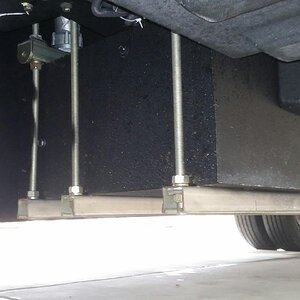ChrisXLS23BHE
RVF Newbee
- Joined
- Nov 13, 2021
- Messages
- 3
Hi,
I am new to the forum and new to the RV world. I purchased a Grand Design XLS 23BHE. I would like to use this RV during the winter months but I can’t get a straight answer from anyone at the dealer as to what the factory min temp design is to prevent freezing. There is an underbelly and he grey/black water piping are exposed. They said add a skirt but it is not appealing to me and requires setup so I would rather spend the money to do it “correctly” to ensure freezing will not occur. My plan would be to add 12 Volt heat trace to the exposed piping and wrap with 1.5” thick arms flex insulation and PVC jacketing. I cannot get a straight answer on possible issue of adding approx 30 WATTS of 12 Volt heat trace and if the current solar system/batteries can handle it, i have 2 lead/acid batteries. I couldn’t get a straight answer on the holding tanks if they need additional heat or insulation for freeze protection.
I live in PA so I am thinking for a low temp of around 15 to 2.0 degrees F and there could be wind involved during the cold months as well.
This is for when it is being used and not just sitting stationary in storage. My goal is to take this hunting out in the middle of nowhere so i will need to rely on the solar system but i do have a generator as well if needed when my solar system fails.
Any input is much appreciated or even a resource i could be pointed towards.
Thank you for you time!
I am new to the forum and new to the RV world. I purchased a Grand Design XLS 23BHE. I would like to use this RV during the winter months but I can’t get a straight answer from anyone at the dealer as to what the factory min temp design is to prevent freezing. There is an underbelly and he grey/black water piping are exposed. They said add a skirt but it is not appealing to me and requires setup so I would rather spend the money to do it “correctly” to ensure freezing will not occur. My plan would be to add 12 Volt heat trace to the exposed piping and wrap with 1.5” thick arms flex insulation and PVC jacketing. I cannot get a straight answer on possible issue of adding approx 30 WATTS of 12 Volt heat trace and if the current solar system/batteries can handle it, i have 2 lead/acid batteries. I couldn’t get a straight answer on the holding tanks if they need additional heat or insulation for freeze protection.
I live in PA so I am thinking for a low temp of around 15 to 2.0 degrees F and there could be wind involved during the cold months as well.
This is for when it is being used and not just sitting stationary in storage. My goal is to take this hunting out in the middle of nowhere so i will need to rely on the solar system but i do have a generator as well if needed when my solar system fails.
Any input is much appreciated or even a resource i could be pointed towards.
Thank you for you time!













